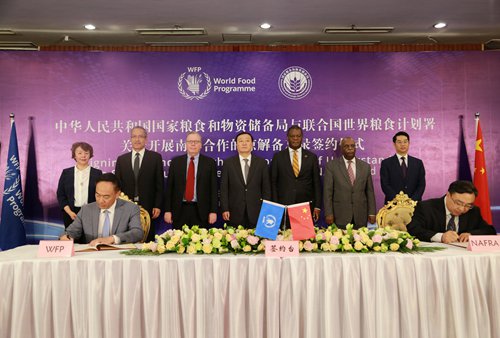HOME >> BUSINESS
China, UN sign MOU on global food security amid uncertainties
Source:Global Times Published: 2019/6/20 20:23:40

Officials and representatives from China and the UN World Food Program seen at the signing ceremony on Thursday Photo: Courtesy of National Food and Strategic Reserves Administration
China on Thursday signed a memorandum of understanding (MOU) with the UN World Food Program (WFP) in Zhengzhou, Central China's Henan Province, a major move to recognize China's contribution to global food security and show the country's willingness to share its agricultural experience with more developing countries amid an unstable global situation.
China's food security guarantee capability has improved markedly over years of development, Zhang Wufeng, director of the National Food and Strategic Reserves Administration, said at the signing ceremony on Thursday, adding that the country could now ensure basic self-sufficiency of grain, which has effectively promoted the sound and stable development of China's economy and made positive contributions to world food security.
"China is willing share its knowhow in the sector, such as experience in grain storage system management, with more developing countries in the world and thus ensure global food security," Zhang noted.
In December 2018, China and the WFP signed an agreement help five African countries - Somalia, South Sudan, the Democratic Republic of Congo, the Republic of Congo and Lesotho - to address their food security challenges.
China's assistance has enabled the WFP to purchase more than 8,700 tons of rice in China and other food globally that will benefit approximately 300,000 people in African countries, according to the WFP.
The world needs China to join in the efforts to address issues such as poverty and hunger, and it also needs lessons and China's own experience in these areas, Stanlake Samkange, director of policy and programs of the WFP, said during the forum.
Over the past six years, China has lifted 82.39 million rural poor out of poverty, with the rural poor population falling from 98.99 million in 2012 to 16.6 million in 2018, according to a report from the Xinhua News Agency. The country has also set a goal of completely eliminating absolute poverty by 2020.
Officials and enterprises in China's agricultural sector reemphasized the importance of boosting development of the country's grain sector during an industry seminar held in Zhengzhou on Thursday, arguing that domestic food security would be a stabilizer for the national economy.
"To expand agricultural cooperation with countries like Russia, diversify import sources and expand planting areas of certain agricultural products such as soybeans will be vital to maintain food safety and make sure China could have an advantage in the trade war with the US," an industry representative who preferred to remain anonymous told the Global Times on Thursday.
Posted in: ECONOMY